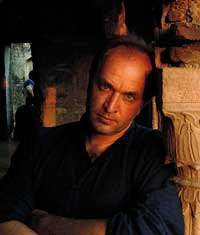 William Delrymple (his website), a historian, writes in Guardian that during Benazir bhutto first (1988-90) 20-month long premiership, astonishingly, she failed to pass a single piece of major legislation. Her reign was marked by massive human rights abuse: Amnesty International accused her government of having one of the world's worst records of custodial deaths, extrajudicial killings and torture.
William Delrymple (his website), a historian, writes in Guardian that during Benazir bhutto first (1988-90) 20-month long premiership, astonishingly, she failed to pass a single piece of major legislation. Her reign was marked by massive human rights abuse: Amnesty International accused her government of having one of the world's worst records of custodial deaths, extrajudicial killings and torture.Bhutto's premiership was also distinguished by epic levels of corruption. In 1995 Transparency International (Website)named Pakistan one of the three most corrupt countries in the world. Bhutto and her husband, Asif Zardari - widely known as "Mr 10%" - faced allegations of plundering the country.

Behind Pakistan's swings between military government and democracy lies a surprising continuity of interests: to some extent, the industrial, military, landowning, and bureaucratic elites are all interrelated and look after one another. The current negotiations between Musharraf and Bhutto - which have excluded Bhutto's democratic rival Nawaz Sharif - are typical of the way that the civil and military elites have shared power with little reference to the electorate.
 According to the political scientist Ayesha Siddiqa, "The military and the political parties have all failed to create an environment where the poor can get what they need from the state. So the poor have begun to look to alternatives for justice. In the long term, flaws in the system will create more room for the fundamentalists."
According to the political scientist Ayesha Siddiqa, "The military and the political parties have all failed to create an environment where the poor can get what they need from the state. So the poor have begun to look to alternatives for justice. In the long term, flaws in the system will create more room for the fundamentalists."Delrymple further writes that until then, if Pakistanis only have a choice between the inter-related feudal and military elites, the growth of the Islamist parties will continue, and the country's violent upheavals can only escalate. (Full Article)
No comments:
Post a Comment